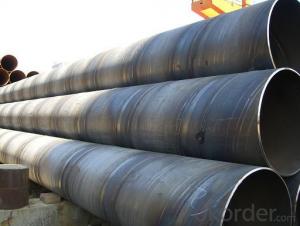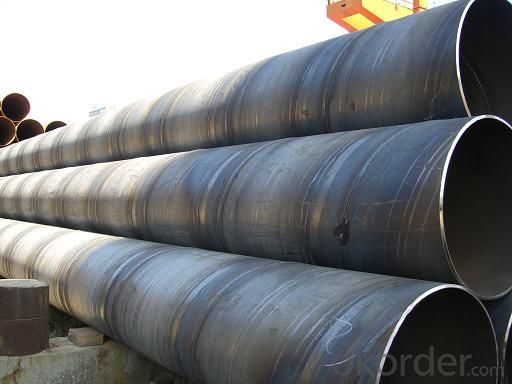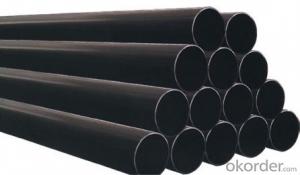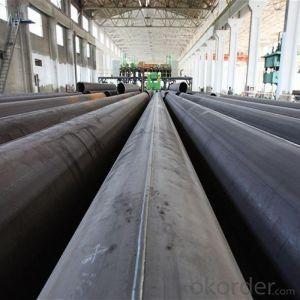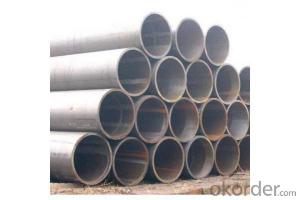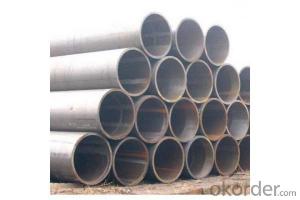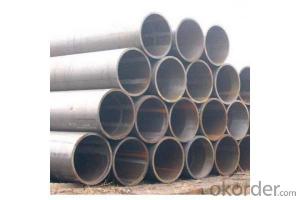API SSAW LSAW CARBON STEEL PIPE LINE OIL GAS PIPE 16''
- Loading Port:
- Tianjin
- Payment Terms:
- TT OR LC
- Min Order Qty:
- 1 m.t.
- Supply Capability:
- 3000 m.t./month
OKorder Service Pledge
OKorder Financial Service
You Might Also Like
Packaging & Delivery
Packaging Detail: | standard export packing or as customer's requirement |
Delivery Detail: | within 10 - 30 days |
Specifications
Spiral Welded Steel Pipes and Tubes
1.Material:Q195-Q235
2.Length:1-12m
3.WT:1.0-14mm
4.O.D.:20-273mm
Spiral Welded Steel Pipes and Tubes
Product Description:
1.Material : Q235,Q345,L245,L290,L360,L415,L450,L485,GrB,X42,46,X52,X56,X60,X65,X70,X80,X100
2,Standard: SY/T5037-2000,GB/T9711-2011,API Spec 5L PSL1/PSL2,ASTM A252\A53,ISO3183,DIN17172,EN10217,JIS G3457,AWWA C200,ASTM A139,ASTM A671,ASTM A672
3.Wall thickness: 3.0mm-30mm
4.Outer diameter: φ168mm-3020mm
5,Length: 5m-12m or as your requirement
6,Corrosion protection standard: DIN30670,DIN30671, AWWAC210, AWWA C203, SY/T0413-2002,SY/T0414-2002
7,Application: Oil, gas, natural gas, water pipe, thermal electricity pipe, steel structure engineering, etc
Q195-q345 Material Steel Pipe's Materials
Elements | Chemical Compsition% | Mechanical Property | ||||||
C% | Mn% | S% | P% | Si% | Yield Point (Mpa) | Tensile Strength(Mpa) | Elongation | |
Q195 | 0.06-0.12 | 0.25-0.50 | <0.050< span=""> | <0.045< span=""> | <0.030< span=""> | >195 | 315-430 | 32-33 |
Q215 | 0.09-0.15 | 0.25-0.55 | <0.05< span=""> | <0.045< span=""> | <0.030< span=""> | >215 | 335-450 | 26-31 |
Q235 | 0.12-0.20 | 0.30-0.70 | <0.045< span=""> | <0.045< span=""> | <0.030< span=""> | >235 | 375-500 | 24-26 |
Q345 | <0.20< span=""> | 1.0-1.6 | <0.040< span=""> | <0.040< span=""> | <0.55< span=""> | >345 | 470-630 | 21-22 |
Packaging & Delivery
Packaging Detail: | Normal exporting packing,in container or bulk vessel or as per clients' request |
Delivery Detail: | 2 months after confimed contract |
Specifications
Large Diameter API 5L X70 PSL2 LSAW Steel Pipe
Grade: X42, X46, X50, X52, X60, B, C
OD: 1.5"-28"
WT: SCH10-SCH160
Large Diameter API 5L X70 PSL2 LSAW Steel Pipe
Specifications:
u Standard: API 5L
u Grade: B, C, X42, X46, X50, X52, X56, X60, X65, X70, X80
u OD: 1.5"-28"
u WT: SCH10-SCH160
u Length: 5-12m
u Ends Finish: plain end, bevel end, grooved end
u Surface Treatment: bare, black varnished, oiled finish, red color, anti-corrosion, 3PE, FBE or epoxy coating
u Technique: hot rolled or cold drawn
u Application: api 5l steel pipe for conveying oil, water, gas
u Invoicing: based on theoretical weight or actual weight
u Payment Terms: L/C at sight, T/T or Western Union
u Trade Terms: FOB, CFR, CIF
u Certification: ABS manufacturing assessment, ABS design assessment, API 5CT, API 5L, DNV manufacturer certificate, ISO9001 quality management system certificate, ISO14001 environment management system certificate, GB/T28001 occupational health and safety management system certificate, A1 class manufacturing license of special equipment certificate, CCS, GL, LR, SGS, TüV, PDE
- Q: How are steel pipes used in the manufacturing of bicycles?
- Steel pipes are used in the manufacturing of bicycles as they provide a strong and durable framework for the bicycle's structure. These pipes are typically used to construct the frame, handlebars, and seat post, ensuring stability and support for the rider. Additionally, steel pipes allow for customization and flexibility in design, allowing manufacturers to create various types and styles of bicycles to suit different riding needs.
- Q: How are steel pipes used in the defense sector?
- Steel pipes are used in the defense sector for various purposes such as constructing military infrastructure, including bunkers, underground facilities, and missile silos. They are also utilized in the manufacturing of military vehicles, weapons systems, and equipment. Steel pipes provide strength, durability, and resistance to extreme conditions, making them ideal for applications in the defense sector.
- Q: How do you join two steel pipes together without welding?
- There are various ways to join two steel pipes together without welding. Mechanical fittings or connectors are commonly used for this purpose. These fittings are designed to securely connect pipes without the need for welding. Here are a few options you can explore: 1. Threaded Fittings: You can use threaded fittings, which have male and female threads that allow you to screw them together. To join the pipes, you will need to cut the ends of the pipes to create male and female threads. Apply thread sealant to ensure a tight and leak-free connection. 2. Compression Fittings: Another option is compression fittings, which consist of a nut, a compression ring, and a compression seat. These fittings create a tight seal by compressing the ring against the seat. Simply slide the compression ring and nut onto the pipe ends, and use a wrench to tighten the nut until a secure connection is formed. 3. Flange Connections: Flange connections involve using flanges, which are flat plates with bolt holes, to join the pipes. The flanges are bolted together using gaskets to create a tight seal. This method is commonly used for larger diameter pipes or in situations where frequent disassembly may be necessary. 4. Grooved Couplings: Grooved couplings are another option, particularly in plumbing and fire protection systems. They utilize a mechanical coupling housing with two grooved ends that fit over the pipe ends. The coupling is then secured using bolts or screws, which tighten the housing around the pipe ends, creating a secure connection. Before deciding on a method, it is crucial to consider the specific requirements of your application, such as the pipe diameter, pressure, and temperature. Additionally, ensure that the chosen method complies with relevant industry standards and regulations to ensure a safe and reliable connection.
- Q: Can steel pipes be used for transporting drinking water?
- Indeed, steel pipes have the capacity to transport drinking water. These pipes are extensively employed in water distribution networks and have a long history of usage. Renowned for their robustness, potency, and ability to resist corrosion, steel pipes are highly favored. Nonetheless, it is imperative to ensure that steel pipes designated for drinking water transportation are adequately coated or lined in order to avert any potential contamination originating from the metal. Moreover, it is crucial to conduct routine inspections and maintenance to safeguard the pipes' integrity and to forestall any leaks or ruptures that could jeopardize the water's quality.
- Q: How do you calculate the buoyancy of submerged steel pipes?
- To calculate the buoyancy of submerged steel pipes, you need to determine the weight of the displaced fluid. This can be done by multiplying the volume of the submerged portion of the pipe by the density of the fluid. The buoyant force is then equal to the weight of the displaced fluid.
- Q: What are the factors affecting the durability of steel pipes?
- There are several factors that can affect the durability of steel pipes. These include corrosion, temperature fluctuations, mechanical stress, and exposure to chemicals or abrasive materials. Additionally, the quality of the steel used in the pipes, the design and construction of the piping system, and proper maintenance and inspection practices can also impact their durability.
- Q: How are steel pipes used in the electronics industry?
- Steel pipes are commonly used in the electronics industry for various purposes such as cable management, structural support, and conduit systems. They provide a strong and durable solution for organizing and protecting electrical wires and cables. Additionally, steel pipes are utilized in the construction of electronic equipment enclosures and racks, ensuring stability and efficient cooling.
- Q: What's the difference between hot-rolled seamless steel tube and cold-rolled seamless steel tube?
- Cold rolled seamless steel pipe (DIAL) in general, steel pipe for low and medium pressure boiler tube, high-pressure boiler steel pipe, alloy steel pipe, stainless steel pipe, oil cracking tube and other steel tube, including carbon thin-walled steel, alloy thin-walled steel, stainless steel, thin steel tube.
- Q: How are steel pipes inspected for quality control?
- Steel pipes are inspected for quality control through various methods such as visual inspection, dimensional measurement, non-destructive testing techniques like ultrasonic testing, magnetic particle testing, and hydrostatic testing. These inspections ensure that the pipes meet the required specifications, are free from defects, and possess the necessary strength and integrity.
- Q: What are the environmental impacts of steel pipe production and disposal?
- The production and disposal of steel pipes have significant environmental impacts. Firstly, the production of steel pipes requires the extraction of raw materials such as iron ore, coal, and limestone. This extraction process leads to habitat destruction, deforestation, and soil erosion. Additionally, mining and processing these materials require a considerable amount of energy, often derived from fossil fuels, contributing to greenhouse gas emissions and air pollution. The manufacturing process itself involves various stages, including melting, casting, rolling, and coating, all of which require substantial energy inputs and emit significant amounts of carbon dioxide and other greenhouse gases. Moreover, the production of steel pipes involves the use of chemicals and additives that can be harmful to the environment if not managed properly. Furthermore, during the disposal of steel pipes, if not recycled or properly managed, they can end up in landfills, contributing to waste accumulation and taking up valuable space. Steel is generally non-biodegradable and can take hundreds of years to decompose. When steel pipes are dumped in landfills, they can release toxic substances and heavy metals, which can contaminate soil and groundwater. However, it is important to note that steel pipes are highly recyclable, and recycling them significantly reduces the environmental impact. Recycling steel pipes helps conserve natural resources, reduces energy consumption, and lowers greenhouse gas emissions. Additionally, using recycled steel in the production of new pipes requires less energy and results in fewer emissions compared to using virgin materials. To minimize the environmental impacts of steel pipe production and disposal, it is crucial to promote sustainable practices throughout the entire lifecycle of the product. This includes reducing energy consumption, utilizing renewable energy sources, implementing proper waste management strategies, and encouraging the recycling and reuse of steel pipes.
Send your message to us
API SSAW LSAW CARBON STEEL PIPE LINE OIL GAS PIPE 16''
- Loading Port:
- Tianjin
- Payment Terms:
- TT OR LC
- Min Order Qty:
- 1 m.t.
- Supply Capability:
- 3000 m.t./month
OKorder Service Pledge
OKorder Financial Service
Similar products
Hot products
Hot Searches
Related keywords
